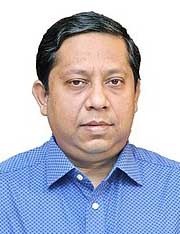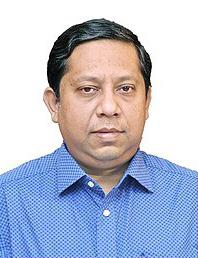Health budget in the context of Covid-19 pandemic


As the budget is knocking at the door, this year it will be special in all respects. The nation is going to prepare a budget to face a pandemic for the first time in it’s existence. Logically and naturally fund allocated to the health sector in the next budget will be on the radar of all concerned.
As a physician I have been trying to track news related to the next health budget as well as performance of the health sector in budget utilization during the current year. It so appears that in the coming budget, health will be fifth in the honour list with the maximum budget allocation going to the Ministry of Local Government, followed closely by the Ministry of Defense.
Although it was expected that health sector will get the gold medal at least in the coming budget given the ongoing pandemic, it is now evident that is not going to be the case. Health will get approximately BDT 25 thousand crores. This is less than 5% of our total budget and less than 1% of our GDP. We stand in the lower side of the table of 48 Asian-Pacific nations when we talk of budget allocation for health.
Interestingly our allocation for health has tripled in the last 10 years. However when we look in percentage, we see that in 20110-2011 fiscal, the allocation in this sector was 6.2% of the total national budget, which has shrunken to 4.9% in 2019-2020.
And this is also obvious from our COVID-19 response that our health sector lacked the inherent strength to face the pandemic compared to the other administrative wings of the government. A senior official of the Planning Commission of Bangladesh government had no hesitation in admitting this on record to a print media recently.
As I dig deeper I discovered the reason. The Ministry of Health & Family Welfare has returned unutilized BDT 3000 crores to the government exchequer during the current fiscal. The Hon’ble Finance Minister, if I am not wrong, has also cited this as one of the reasons why the health budget of the country is not being raised.
So at least I find no reason in increasing the health budget if the money is not well spent and significant money remains unutilized at the end of the day. It is therefore crucial that the efficiency of the Directorates under this very important Ministry be raised to match that of the Ministry of Energy & Mineral Resources or Ministry of Highways & Bridges for example.
However a special allocation of ten thousand crores is likely to be made in favour of Health Service Division to face any COVID-19 related emergency, including establishing ICUs, purchasing ventilators, establishing isolation facilities and support care, purchase of SARS-CoV-2 testing kits, PPEs and so on.
Besides special tax benefit will be offered for production and marketing of drugs as well as import and production of accessories for management of COVID-19 patients. This is extremely reassuring.
However it is perhaps not a healthy approach to allocate a petty sum of BDT 300 crores for COVID-19 research, as is learnt from a recent newspaper report. When the world is diverting hundreds of millions of dollars for development of a single drug or a vaccine against SARS-CoV-2, this amount, as anyone will agree, will be shear wastage of tax payer’s money as this will contribute nothing in this direction.
I would rather recommend that the government invites Bangladeshi experts from home and abroad with proven track record in research and initiate a dialogue to explore if there is anything prospective in their basket that will contribute to the advancement of prevention or management of SARS-CoV-2 infection. If there is any ray of light, only then appropriate budget allocation may be made from the taka ten thousand crores emergency fund that will be kept reserved for the Health Service Division in the coming budget.
It is anticipated that in the coming health budget, infrastructure development and procurement of modern equipment will be prioritized. Out of the 67 investment projects under the Health and family Welfare Ministry, 48 involve construction works, 3 are related to expansion of specialized treatment and 1 to procurement of machinery.
It is not clear whether there is any sufficient emphasis in the next budget for manpower and expertise development in the health sector. I strongly feel that this is one area where much more attention and funding needs to be diverted. Let’s take the case of PCR labs for instance. We had only one functioning PCR lab in the government sector on March 8, when we first diagnosed COVID-19 cases in the country.
Since then the government has gone a long way in raising the total number of PCR labs to 55 in around two months time. This has increased our testing capacities many folds, but the unfortunate fact remains that the labs are barely functioning at only one third to fifty percent of their capacities due to the very reason of lack of technical manpower for collecting samples and running the PCR machines. Not only so, whereas it is a settled issue that PCR tests are 100% accurate in diagnosing SARS-CoV-2, we are seeing significant incorrect results in Bangladesh.
This also attributes to the fact that we have shortage of skilled manpower for running the show. So when the World Bank is talking of procuring 150 more PCR machines for us, many are getting exited. However in my case, the emotions are reverse as I afraid that we may not have adequate trained manpower.
At the same time more technical manpower needs to be pumped into our health sector. It is praiseworthy that the government has raised the status of the nurses and the recruitment of doctors and nurses are ongoing. Thousands of them have been recruited during COIVID-19 pandemic and recently we have learnt that three thousand plus technicians will be added to the government health care delivery system soon. These are no doubt ‘praiseworthy’ initiatives and should remain ongoing.
I would prefer adding a paragraph here on a neglected group of professionals. It sometimes appears to me that our public and private universities are producing Pharmacists every year for the sake of foreign countries.
Thet are adored beyond our boundaries, but ignored within. If we are looking for a healthcare delivery system at par with ‘digital Bangladesh’ during COVID-19 pandemic and beyond, the recruitment of hospital pharmacists is mandatory, the justification of which is beyond the scope of the present discussion. I plan to shed light on this issue on another instance.
I would also recommend more attention to communicable disease control. In the immediate pre-COVID-19 period, we were seeing emphasis on non-communicable diseases, like cancers, accident and trauma, kidney failure and so on so forth. There was nothing wrong in this approach, as this was the pre-COVID-19 global trend.
The US President terminated provision for emergency pandemic allocation in the US budget only last year, assuming that the pandemic days were bygone. I have myself heard a senior Japanese health official telling CNN that Japan can never provide enough ventilators for all COVID-19 patients as a pandemic of this magnitude was never in their radar. However it is now well understood that things will not be the same again.
We have seen that ECNEC has already approved a project for establishing infectious disease prevention and control units at the upozilla level. We need more such initiatives, specially tertiary level national institutes with treatment and research facilities for important communicable diseases for example national institute of liver diseases and national institute of infectious diseases.
Being a physician, my talking about the most difficult chapter of Economics, does not even make me too comfortable. This was the reason why I was little hesitant, whether to write on this issue or not.
However then I felt than being an integral part of the system, I will not do justice to myself and to the people of this country, if being a university faculty and a health professional at the same time, I don’t share my real life experience in this regard. I have therefore refrained from diuscuissiong the numbers, but emphasized on the hypothetical discussions.
Professor Dr Mamun Al Mahtab (Shwapnil) is chairman of the Department of Hepatology at Bangabandhu Sheikh Mujib Medical University and member secretary of Samprity Bangladesh



